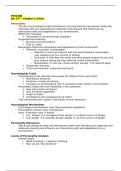Class notes
Lecture Notes - PSYC305 (Personality Psychology)
- Course
- Personality Psychology
- Institution
- University Of British Columbia (UBC )
Explore the theories, concepts, and research methods that contribute to our understanding of human personality. Dive into the exploration of personality traits, development, and their impact on behaviour and relationships. These notes provide a concise overview, inviting you to explore the dynamic ...
[Show more]



